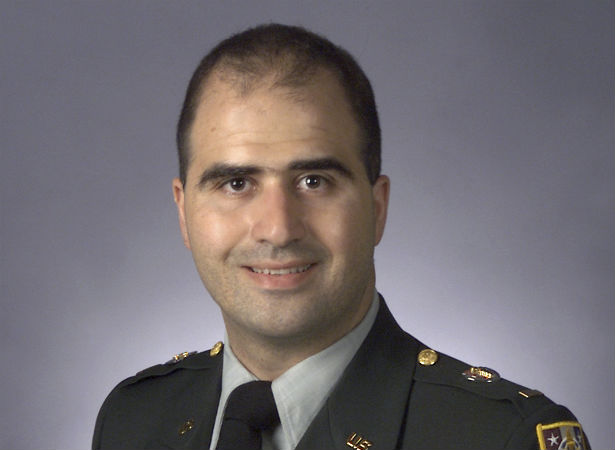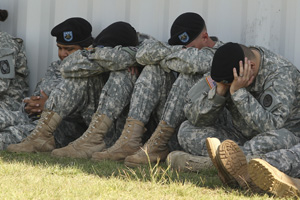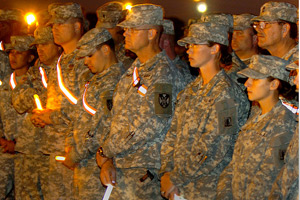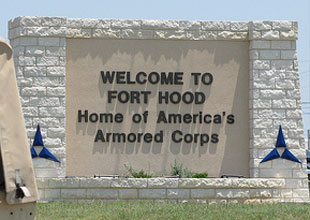
Nidal Hasan, the Fort Hood gunman.Uniformed Services University/ZUMA
Last Thursday, as the jury in the trial of Nidal Hasan was deliberating, outgoing FBI Director Robert Mueller appeared on CBS News and discussed a string of emails between the Fort Hood shooter and Anwar al-Awlaki, a radical Islamic cleric with ties to the 9/11 hijackers. The FBI had intercepted the messages starting almost a year before Hasan’s 2009 shooting rampage, and Mueller was asked whether “the bureau dropped the ball” by failing to act on this information. He didn’t blink: “No, I think, given the context of the discussions and the situation that the agents and the analysts were looking at, they took appropriate steps.”
In the wake of the Fort Hood attacks, the exchanges between Awlaki and Hasan—who was convicted of murder on Friday—were the subject of intense speculation. But the public was given little information about these messages. While officials claimed that they were “fairly benign,” the FBI blocked then-Sen. Joseph Lieberman’s efforts to make them public as part of a two-year congressional investigation into Fort Hood. The military judge in the Hasan case also barred the prosecutor from presenting them, saying they would cause “unfair prejudice” and “undue delay.”
As it turns out, the FBI quietly released the emails in an unclassified report on the shooting, which was produced by an investigative commission headed by former FBI director William H. Webster last year. And, far from being “benign,” they offer a chilling glimpse into the psyche of an Islamic radical. The report also shows how badly the FBI bungled its Hasan investigation and suggests that the Army psychiatrist’s deadly rampage could have been prevented.
Hasan first appeared on the bureau’s radar in December of 2008—nearly a year before the Fort Hood massacre—when he emailed Awlaki to ask him whether serving in the US military was compatible with the Muslim faith. He also asked whether Awlaki considered those who died attacking their fellow soldiers “shaheeds,” or martyrs.
At the time, Awlaki, who was killed by a US drone strike in 2011, was emerging as Al Qaeda’s chief English-speaking propagandist. He was also known to have ties to several of the 9/11 hijackers, two of whom attended his mosque in San Diego.
The FBI’s Joint Terrorism Task Force in San Diego, which was tracking Awlaki, intercepted Hasan’s December email, along with another sent in January. A search of the Pentagon’s personnel database turned up a man named Nidal Hasan who was on active military duty and was listed as a “Comm Officer” at Walter Reed Army Medical Center in Washington, DC.
Normally, when the FBI unearths this kind of raw intelligence, it issues an Intelligence Information Report (IIR), which is shared with law enforcement agencies and the Office of the Director of National Intelligence. (This system was designed to prevent the kind of information bottlenecks that allowed the 9/11 plot to go undetected.) But the San Diego agents misinterpreted the “Comm Officer” label in Hasan’s file to mean “communications officer” (in fact, it meant “commissioned officer”) and believed that a person in this role might have access to IIRs. To avoid tipping him off, they skipped the report and sent a detailed memo requesting an investigation directly to the Washington, DC, Joint Terrorism Task Force, a multiagency team overseen by the FBI that investigates terrorism cases in the capital. The message noted that Hasan’s “contact with [Awlaki] would be of concern if the writer is actually the individual identified above.”
The file languished for nearly two months before it was assigned to an agent for the Defense Criminal Investigative Services, who was on the task force. According to a 2011 report on the Fort Hood shootings by the Senate Homeland Security and Government Affairs Committee, DCIS—a law enforcement agency within the Pentagon, which normally deals with fraud and cybercrime among military personnel and contractors—was ill-equipped to tackle a counterterrorism investigation.
Meanwhile, Hasan kept writing Awlaki. Between January and May 2009, he sent the radical cleric more than a dozen emails, and received two relatively benign responses. In one message, ostensibly about Palestinians firing unguided rockets into Israel, Hasan asked Awlaki whether “indiscriminately killing civilians” was acceptable. Two days later, he sent another message answering his own question: “Hamas and the Muslims hate to hurt the innocent but they have no choice if their going to have a chance to survive, flourish, and deter the zionist enemy. The recompense for an evil is an evil.” (Hasan’s emails contained a number of typos.)
The San Diego field office intercepted these missives, too. But the database where the FBI stored intercepted emails didn’t automatically link messages from the same sender, so the staff didn’t realize that Hasan’s early 2009 emails were from the person who had set off alarms the previous December. Meanwhile, the Washington-based DCIS agent assigned to investigate Hasan put off his inquiry for another 90 days, the maximum allowed under joint task force rules, before conducting a cursory investigation. Over the course of four hours on May 27, 2009, he ran Hasan’s name through several databases to see if the psychiatrist had been targeted in previous counterterrorism probes. He also reviewed Hasan’s Pentagon personnel file. Hasan’s officer evaluations were mostly positive, and the chair of psychiatry at Walter Reed had written that Hasan’s research on Islamic beliefs regarding military service had “extraordinary potential to inform national policy and military strategy.”

The Senate investigation later found these reports “bore no resemblance to the real Hasan, a barely competent psychiatrist whose radicalization toward violent Islamist extremism alarmed his colleagues and his superiors.” Nevertheless, the DCIS investigator concluded, based on Hasan’s file, that the Army psychiatrist had contacted Awlaki in connection with his academic research and “was not involved in terrorist activity.” The DCIS investigator and a supervisory agent in the Washington field office debated interviewing Hasan or his superiors. They ultimately decided doing so could jeopardize the Awlaki investigation or harm Hasan’s career.
Advocates for Fort Hood victims find this decision puzzling. “A US Army major is writing to this imam and essentially asking for religious sanction to kill American soldiers,” said attorney Reed Rubinstein, who represents a group of victims who are suing the federal government. “And the FBI’s Washington field office doesn’t even interview the man or make a phone call to his superiors. It’s utterly incomprehensible.”
In May 2009, around the time the Washington field office wrapped up its Hasan investigation, Hasan’s emails to Awlaki took an ominous turn. In one message, he said he had “heard a speaker defending suicide bombings as permissible” and laid out the speaker’s rationale:
For example, he reported a recent incident were an American Soldier jumped on a grenade that was thrown at a group of soldiers. In doing so he saved 7 soldiers but killed himself…So, he says this proves that suicide is permissible in this example because he is a hero. Then he compares this to a soldier who sneaks into an enemy camp during dinner and detonates his suicide vest to prevent an attack that is know to be planned the following day.
Hasan made the case that the second act was as heroic as the first. He then delved into the question of “‘collateral damage’ where a decision is made to allow the killing of innocents for a valuable target.”
“I would assume that suicide bomber whose aim is to kill enemy soldiers or their helpers but also kill innocents in the process is acceptable,” he wrote.
An FBI agent in the San Diego field office, whom the Webster report identifies as “SD-Agent,” reviewed this email, but again failed to link it to the Hasan case. He ultimately determined it was “Not a Product of Interest.” On June 11, the same agent read the Washington task force’s report on the Hasan investigation. While he still didn’t connect the dots with the message he read, the agent was dismayed that the investigation hadn’t gone deeper and considered the justification for not interviewing Hasan “weak excuses.” His colleagues in San Diego agreed. In fact, according to the Webster Commission, one of them believed Hasan must have been a confidential source—why else would the Washington office conduct such a perfunctory investigation?
At this point, SD-Agent asked the DCIS investigator on his team to press his Washington counterpart to dig deeper, after which the San Diego DCIS agent sent Washington an email asking why the investigation was so “slim.” In a follow-up phone call, he explained that San Diego would have at least interviewed Hasan. According to the Webster Commission, the Washington DCIS agent dismissed these concerns, saying the Washington field office “doesn’t go out and interview every Muslim guy who visits extremist websites” and stressing that the subject was “politically sensitive.” (The Webster report notes that the quotes are not verbatim).
According to the FBI’s policy for resolving interoffice investigative disputes, at this point the San Diego field office should have communicated its concerns up the chain of command. But that didn’t happen. What’s more, none of the FBI agents involved thought to query the bureau’s database of intercepted electronic communications. Had they done so, the Webster Commission found, they would have uncovered other emails that “undermined the assumption” that Hasan had contacted Awlaki “simply to research Islam.”
Within days of the mid-June confrontation between San Diego and Washington, Hasan was transferred to Fort Hood, Texas, where he counseled soldiers returning from Iraq and Afghanistan. He also bought a FN Herstal Five-seveN semiautomatic pistol and 5.7×28 mm bullets, a combination know for its armor-piercing capabilities.* That October, he received word that he would be deploying to Afghanistan, but that never happened. On November 5, Hasan marched into a deployment processing center at Fort Hood and opened fire, killing 13 people—including a pregnant soldier, who curled up on the floor and pled, “My baby! My baby!”—before the Army psychiatrist was shot and paralyzed. According to the congressional investigation, SD-Agent immediately pegged Hasan as the culprit. “You know who that is?” he asked one of his analysts. “That’s our boy.”
Reports of Hasan’s contact with Awlaki quickly surfaced in the media, but the contents of the emails were not made public. On November 8, 2009, the Senate Homeland Security and Government Affairs Committee launched its investigation. According to a former Senate staffer who was involved in the inquiry, the committee struggled to get information from the FBI, which was reluctant to hand over the Awlaki emails and refused to let congressional investigators interview the agents involved. “The FBI insisted that it would have a chilling effect on the people making front-line decisions if they had to worry constantly about Congress calling them in to explain their actions,” the staffer said.
The bureau eventually agreed to let congressional investigators review the emails, but only inside a secure facility. They weren’t allowed to copy the messages or write about them on computers that were connected to the internet, much less discuss them in their final report. Nevertheless, when he presented the committee’s findings in February 2011, then-Sen. Lieberman faulted the FBI and the Pentagon for failing to act on information that, “with the clarity of hindsight just shouts out, ‘Stop this guy before he kills somebody!'”
In July 2012, the Webster Commission released its report, but the document went largely unnoticed. Besides describing the FBI’s missteps in the Hasan case, the report delved into the underlying institutional problems—including shortcomings in the bureau’s training, information-sharing, and intelligence-gathering policies—and proposed a series of reform recommendations. The FBI declined to comment for this story, but it issued a statement saying that it “concurs with the principles underlying all the recommendations and has already taken action to implement them.”
Many of the issues in the Hasan case—particularly the breakdown in interagency communication—are reminiscent of the intelligence failures prior to the 9/11 attacks. One member of the Webster Commission told Mother Jones that the problems with information sharing have actually grown worse since 9/11 because of “the information explosion.”
“Every year the amount of data is doubling,” he said. “The sheer amount of information that might result from legitimate surveillance—or, in a criminal context, a legitimate wiretap—is mind boggling compared to what it was 10 years ago.” He added that the FBI in particular has struggled to manage the surge in intelligence data, as its focus has shifted to counterterrorism, which wasn’t central to its mission before 9/11.
On Friday, a panel of senior military officers found Hasan guilty of 13 counts of murder. This week, they’ll decide whether to give him death or a life sentence. But the final verdict on the FBI’s actions has yet to be delivered. A group of more than 100 Fort Hood victims and victims’ relatives has filed suit claiming that the government’s “gross negligence” and “reckless disregard” for the lives of Fort Hood residents and staff paved the way for the tragedy. “The attack should not have happened,” says Lisa Bahr Pfund, whose daughter, a Fort Hood victim and a plaintiff in the case, took a bullet to the back and suffers from pain so severe that she can’t sit for more than a half hour at a stretch. “It would not have happened if that information was handled properly.”
The damning paper trail laid out in the Webster report should give the plaintiffs ample ammunition.
Clarification: An earlier version of this article referred to Hasan purchasing an “armor-piercing pistol.” He in fact bought a pistol and ammunition that are armor piercing when used in combination.













